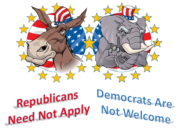Last week, Nonprofit Quarterly (NPQ), a website and magazine that writes about nonprofit management and governance, published an article about “liberating” 501(c)(4) advocacy nonprofits from the “‘dark money’ trap.” It was a response to another recent piece in the American Prospect by Nan Aron and Abby Levine of the progressive Alliance for Justice offering a defense of so-called “dark money.”
The Prospect article argues that progressives should embrace 501(c)(4)s as an important tool for advocacy and political mobilization against the policy agendas of the Trump Administration and the GOP-controlled Congress. It points out that organizations like the ACLU, Human Rights Campaign, and others have utilized such structures for years, and they have served progressives well when advocating for policies like criminal justice reform and same-sex marriage. Why restrict your options for political action when it matters most?
Of course, some progressive groups have also long denounced 501(c)(4)s as a vehicle for wealthy conservatives to unfairly influence public debate, and NPQ’s piece basically rehashes those same points. It expresses concern about the ability of nonprofits to “accept large sums of money to influence a political outcome” and the difficulty in defining what constitutes “political activity.”
Strangely though, the article still argues that nonprofits should participate in political advocacy in order to advance their social missions. The implication seems to be that advocacy is only a cause for concern if particular nonprofits are too effective at promoting their viewpoints (or perhaps if the “wrong” policies are being promoted, since the article mainly discusses the merits of progressive advocacy).
The authors conclude that “[w]hile transparency is absolutely needed, progressive organizations would be smart to use the 501(c)(4) platform to promote their cause while also leading by example with regards to donor transparency.” In other words, progressive nonprofit groups should participate in political debates, but without utilizing the donor privacy protections that happen to be a major factor of what makes nonprofits meaningfully different from, say, PACs.
The NPQ piece is admittedly brief and, perhaps as a result, disappointingly neglects to engage with what it substantively means for progressive nonprofits to “lead[]by example” on “transparency.” Most likely, the authors want advocacy nonprofits to publicly disclose the personal information of some or all of their supporters.
The authors’ failure to even acknowledge the costs of disclosure is alarming. In our age of hyper-partisan and combative politics, being publicly identified as a supporter of a particular organization or cause can be an invitation for threats, harassment, or other abuses. Look to the same-sex marriage debate, for example; in contrast to the success of progressive nonprofits, conservative efforts encountered not only eventual political failure, but something more sinister. Their supporters – from individuals to religious institutions – had their home addresses posted online and faced vandalism and death threats. The former CEO of Mozilla was famously forced out of his own company because of his donation to a ballot measure on the issue.
Because such threats or actions can be carried out by just a small number of people, and given the media’s penchant for misusing disclosure information, mainstream political beliefs can attract similar negative attention if publicized to enough people. Even Americans who aren’t interested in politics at all could be caught in the crossfire if they contribute to a group to support its primarily apolitical activities (nonprofits cannot have political activity as their “major purpose”), but still find their names, occupations, employers, and home addresses publicized in a government database.
The contentiousness of politics today means that people are prone to being declared guilty by mere association, which would encourage potential donors to progressive causes to sit things out if they know their identities will be disclosed by the groups they contribute to, whether by law or voluntarily. That would dry up resources and set back the policy agendas of progressive organizations.
The concept of donor privacy isn’t just in the best interest of advocacy groups, of course. It’s also an essential safeguard for freedom of association and anonymous speech. The Supreme Court has recognized this for decades and taken steps to limit public disclosure requirements to primarily political entities, like candidates, political parties, and PACs. Privacy in political speech has played an essential role in American public debates since its inception – from the Federalist Papers to the Civil Rights Movement to today. NPQ’s article acknowledges that nonprofits should play an important role in advocacy, but those words ring hollow without basic protections for donor privacy.
In some cases, nonprofit organizations and their donors might decide for themselves that they want to disclose. But what happens when donors desire anonymity (for any number of reasons), and nonprofit managers don’t fully grasp the importance of protecting their identities? A failure to stand up for the privacy of their donors would do those individuals a tremendous disservice and undermine the case for why their organizations deserve support to begin with. If such groups can’t grasp the serious tradeoffs of “transparency” and easily succumb to public pressure, how can they be trusted to adequately pursue their mission, especially if it means advocacy in contentious or sensitive public debates?
If NPQ purports to disseminate best practices in nonprofit management, it ought to at least grapple with these questions and fully inform its readers about the risks of disclosure to donors – if not for the sake of those citizens’ privacy, then for the sake of nonprofit organizations’ future viability. Ignoring the reasons nonprofits and Americans prefer privacy in the first place prevents the authors from making a truly compelling case for voluntary disclosure.














